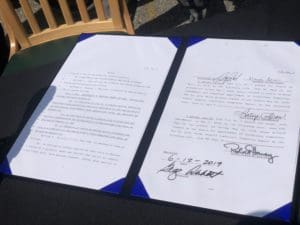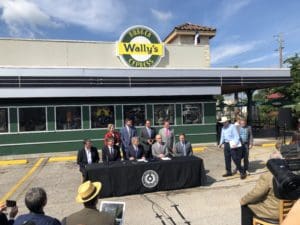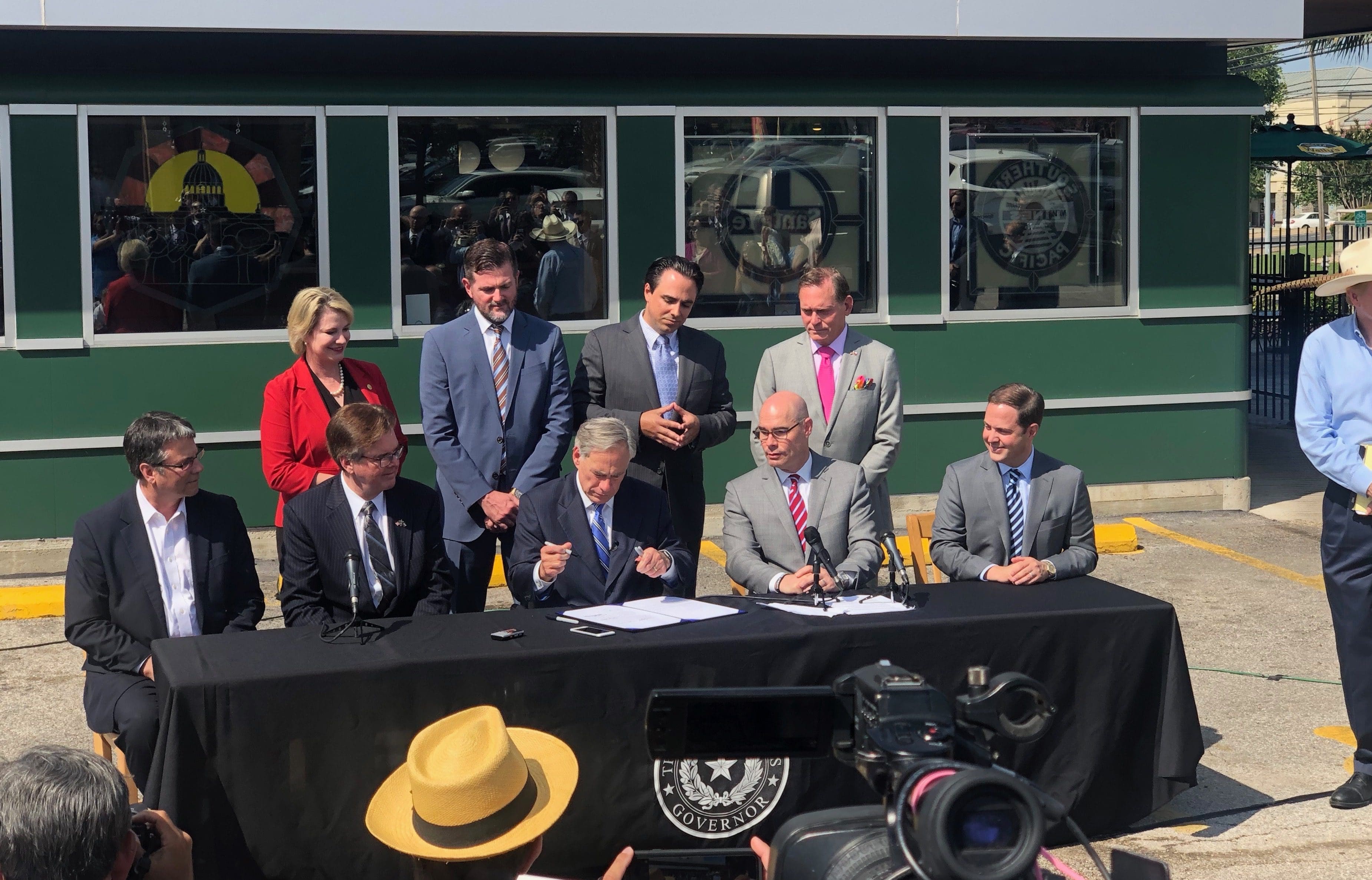Legislation to slow the growth of skyrocketing property taxes in Texas has officially been signed into law by Gov. Greg Abbott, though one absence from the bill’s signing is raising eyebrows.
With an Austin hamburger restaurant burdened by increasing property taxes serving as the backdrop for the signing, Abbott was joined by Lt. Gov. Dan Patrick; House Speaker Dennis Bonnen; State Sen. Charles Perry (R–Lubbock); and State Rep. Dustin Burrows (R–Lubbock), who sponsored the legislation in the Texas House; as well as several other members of the House and Senate.
Notably absent from the affair, however, was Senate Bill 2’s author State Sen. Paul Bettencourt (R–Houston). A longtime advocate for property tax reform, Bettencourt chaired the Senate Property Tax Committee and held interim hearings to listen to taxpayers throughout the state ahead of the legislative session.
Some sources, however, have suggested Bettencourt was not invited to the signing at all after his successful opposition to a sales tax hike proposed by Abbott, Patrick, and Bonnen earlier this year.
When asked why Bettencourt was not present or even mentioned during the nearly 40-minute event, Patrick said that, while he appreciated his contributions to the bill, “I don’t know his schedule or keep it. I don’t know where he is today.”
Bettencourt did not comment on whether or not he was invited to his bill’s signing but was celebratory over the bill’s final hurdle, telling Texas Scorecard, “The clear winners here are the taxpayers of Texas. I am proud of the work I did on their behalf as the author of Senate Bill 2.”
 Senate Bill 2, now known as the Texas Property Tax Reform and Transparency Act, requires any taxing entity to have voter approval during an election in order to raise property tax revenues by more than 3.5 percent. Counties are not required to include the costs of indigent legal defense and county hospitals into that calculation and taxing entities are now allowed an additional “de minimis” exemption of $500,000 of new revenue to not be subject to voter approval.
Senate Bill 2, now known as the Texas Property Tax Reform and Transparency Act, requires any taxing entity to have voter approval during an election in order to raise property tax revenues by more than 3.5 percent. Counties are not required to include the costs of indigent legal defense and county hospitals into that calculation and taxing entities are now allowed an additional “de minimis” exemption of $500,000 of new revenue to not be subject to voter approval.
School districts—which comprise the majority of the average Texan’s property tax bill—will be subject to a 2.5 percent cap. That mechanism, however, will not take effect until 2021.
Abbott says he picked the signing location—Wally’s Burger Express—because they served as an example of a business that has struggled under skyrocketing property taxes, with the establishment’s owner, Robert Mayfield, noting that their property tax bill had increased 44 percent just this year.
“We had to something this session to try to reduce the burden that property taxes are imposing on businesses like Wally’s burgers, as well homeowners across the entire state of Texas,” said Abbott.
“I used to be in the restaurant business. I wasn’t very good at it, back in the ’80s,” Patrick joked, before pointing out that a 44 percent property tax increase would mean Wally’s would have to sell an additional 8,000 hamburgers just to make up for the increased burden.
 “I don’t know exactly what his tax rate will be. Every business will be different, every homeowner will be different,” Patrick conceded. “But we are going to dramatically cut the increase of property taxes, moving forward.”
“I don’t know exactly what his tax rate will be. Every business will be different, every homeowner will be different,” Patrick conceded. “But we are going to dramatically cut the increase of property taxes, moving forward.”
Bonnen, who chaired the House Ways and Means Committee before becoming the Speaker of the House, told those in attendance, “It’s pretty extraordinary, sitting here. After the 2017 regular and special session, the failure to succeed on this issue hit me harder than I’ve ever been hit as a legislator, and I seriously considered not returning to the Texas House.”
Bonnen then added that he was glad “to be sitting here today with a victory for the people of Texas that is more significant than what we were even discussing last session.”
The actual, realized effects of the bill—combined with state spending to temporarily lower property taxes in the education spending legislation House Bill 3, which was signed yesterday—have yet to be seen. But Texans across the state, who have long struggled with increasing property taxes and repeated promises by politicians to fix the problem, will no doubt be on alert ahead of election time next year.





